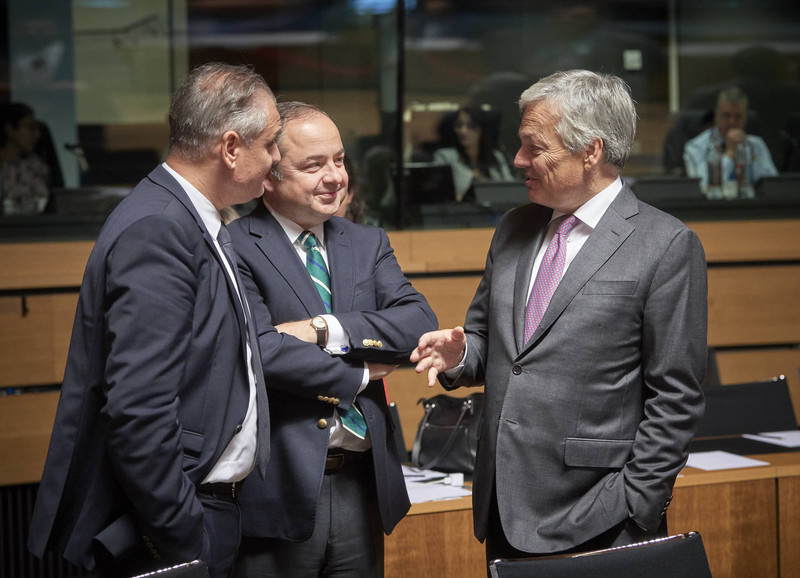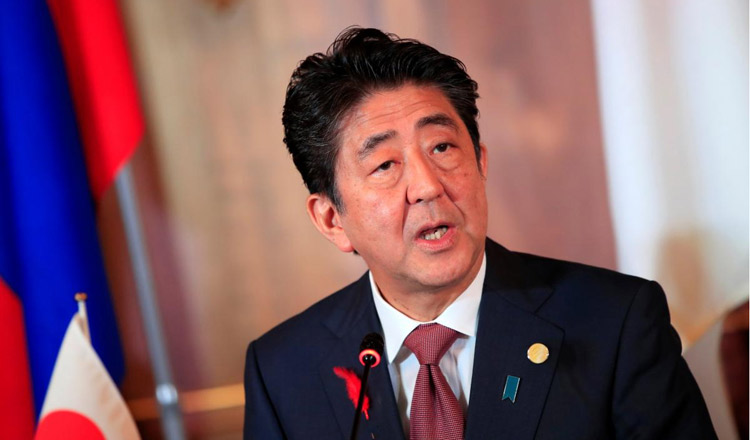
EU Observer (16 October 2018)
EU affairs ministers on Tuesday (16 October) discussed the rule of law in Poland and Hungary and how to move forward procedures that are designed to keep a check on member states that breach EU values and rules.
On Poland, after two rounds of earlier discussions where Warsaw had presented its own views on its internal judicial reform that the EU Commission deemed problematic, ministers this time talked about the latest developments.
Commission vice-president Frans Timmermans expressed concern that the situation in Poland has deteriorated since the ministers last put the issue on their agenda.
The EU executive recently referred Poland to the EU's top court over its controversial 'reform' of the supreme court, which could force 40 percent of its judges out via early retirement. The commission sees this an attempt to put the court under political control.
Warsaw argues the reforms are needed to get rid of the last remnants of from the communist era, after courts had failed to modernise.
The European Court of Justice is expected to introduce so-called 'interim measures', which would call on the Polish authorities to suspend the implementation of the reform of the supreme court until the ECJ's ruling.
The attempt to remove some supreme court judges is just the latest in a series of measures by the nationalist Warsaw government of the Law and Justice party (PiS) that has raised concerns at the commission, which launched the Article 7 sanctions procedure last year.
Timmermans told reporters after the meeting that he was worried that the Polish government would not wait for the ECJ's ruling. Poland's president Andrzej Duda swore in 27 new supreme court judges last week, stepping up the pace of the conflict over control of the judiciary.
"Sadly, things have not improved, they have deteriorated," Timmermans said.
"[It is] especially disappointing that now there is a procedure at the European Court of Justice, and the Polish authorities have not used the fact that there this procedure to stop the implementation of the reform of the supreme court, in fact they speeded up that process by nominating ever more judges to the court," he added.
Timmermans also expressed concern over reports of intimidation of judges by the Polish authorities who turned to EU court for an assessment of the reforms.
Timmermans told ministers that the intimidation of judges in Poland could affect the judicial systems in other EU countries, as Ireland and the Netherlands have already expressed concern over Poland's rule of law in extradition cases.
Around ten member states' delegations spoke out in support of the concerns expressed by the commission.
They emphasised the need for tangible results and expressed regret that despite the ongoing dialogue with the Polish authorities, nothing has happened on the ground.
A hearing is possible again on Poland at the next meeting, as ministers take a step back to wait for the ECJ's ruling on the supreme court reform.
Hungary procedure
The EU's other 'problem child', Hungary, was also on the agenda of the ministers.
Last month in an unprecedented move, the European Parliament triggered the Article 7 procedure against Hungary over rule of law concerns and a backsliding on democratic values.
Article 7 can be launched by either the parliament, the commission or a third of the member states in the council, but the procedure of checking if a particular member state is in breach of EU rules and values and acting on it, is the responsibility of the council.
The parliament's president Antonio Tajani sent a letter to the Austrian presidency of the council asking for a role for the parliament in the procedure among ministers.
This presents an institutional dilemma for member states as the parliament does not have a role in the council, according to the council's legal service, and countries do not want to create a precedent.
However, several member states supported a pragmatic approach to include the parliament in a way, without breaking council rules. A decision on the procedure will be made later.
In the meantime, the ministers asked Hungary to submit a written statement on the parliament's rule of law report, and an "up-to-date, factual" overview from the commission on infringement procedures that the EU executive launched against Hungary.
There was no timeline set for the two statements to be submitted, and EU diplomats will tackle the procedural issues before the topic will be put on ministers' agenda again.
Both the Polish and Hungarian cases are highly sensitive - EU member states are reluctant to discipline each other, and are eager to be seen as driving an impartial procedure.
In addition, both Poland and Hungary have said they would vote against any sanctions proposed on the other, blocking the possibility of any disciplinary measures in the future.
No comments yet.
- IRAN IN TALKS WITH SERBIA ON VISA ISSUANCE The Balkans 17.10.2018
-
 MEKONG-JAPAN COOPERATION ENTERS A NEW DIMENSION
Asia - Pacific
17.10.2018
MEKONG-JAPAN COOPERATION ENTERS A NEW DIMENSION
Asia - Pacific
17.10.2018
- SOUTH KOREA TO STRENGTHEN DIPLOMATIC RELATIONS WITH INDONESIA, ASEAN Asia - Pacific 17.10.2018
- ALBANIA LAUNCHES ROAD CONNECTION PROGRAM FUNDED BY WORLD BANK LOAN The Balkans 17.10.2018
- MINISTER OF FOREIGN AFFAIRS DAVIT ZALKALIANI MEETS IRISH COUNTERPART IN LUXEMBOURG The Caucasus and Turkish-Armenian Relations 17.10.2018
-
25.01.2016
THE ARMENIAN QUESTION - BASIC KNOWLEDGE AND DOCUMENTATION -
12.06.2024
THE TRUTH WILL OUT -
27.03.2023
RADİKAL ERMENİ UNSURLARCA GERÇEKLEŞTİRİLEN MEZALİMLER VE VANDALİZM -
17.03.2023
PATRIOTISM PERVERTED -
23.02.2023
MEN ARE LIKE THAT -
03.02.2023
BAKÜ-TİFLİS-CEYHAN BORU HATTININ YAŞANAN TARİHİ -
16.12.2022
INTERNATIONAL SCHOLARS ON THE EVENTS OF 1915 -
07.12.2022
FAKE PHOTOS AND THE ARMENIAN PROPAGANDA -
07.12.2022
ERMENİ PROPAGANDASI VE SAHTE RESİMLER -
01.01.2022
A Letter From Japan - Strategically Mum: The Silence of the Armenians -
01.01.2022
Japonya'dan Bir Mektup - Stratejik Suskunluk: Ermenilerin Sessizliği -
03.06.2020
Anastas Mikoyan: Confessions of an Armenian Bolshevik -
08.04.2020
Sovyet Sonrası Ukrayna’da Devlet, Toplum ve Siyaset - Değişen Dinamikler, Dönüşen Kimlikler -
12.06.2018
Ermeni Sorunuyla İlgili İngiliz Belgeleri (1912-1923) - British Documents on Armenian Question (1912-1923) -
02.12.2016
Turkish-Russian Academics: A Historical Study on the Caucasus -
01.07.2016
Gürcistan'daki Müslüman Topluluklar: Azınlık Hakları, Kimlik, Siyaset -
10.03.2016
Armenian Diaspora: Diaspora, State and the Imagination of the Republic of Armenia -
24.01.2016
ERMENİ SORUNU - TEMEL BİLGİ VE BELGELER (2. BASKI)
-
AVİM Conference Hall 24.01.2023
CONFERENCE TITLED “HUNGARY’S PERSPECTIVES ON THE TURKIC WORLD"









